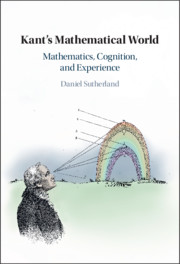Book contents
- Kant’s Mathematical World
- Kant’s Mathematical World
- Copyright page
- Dedication
- Contents
- Preface and Acknowledgments
- 1 Introduction
- Part I Mathematics, Magnitudes, and the Conditions of Experience
- Interlude The Greek Mathematical Tradition as Background to Kant
- Part II Kant’s Theory of Magnitudes, Intuition, and Measurement
- Bibliography
- Index
1 - Introduction
Mathematics and the World of Experience
Published online by Cambridge University Press: 21 October 2021
- Kant’s Mathematical World
- Kant’s Mathematical World
- Copyright page
- Dedication
- Contents
- Preface and Acknowledgments
- 1 Introduction
- Part I Mathematics, Magnitudes, and the Conditions of Experience
- Interlude The Greek Mathematical Tradition as Background to Kant
- Part II Kant’s Theory of Magnitudes, Intuition, and Measurement
- Bibliography
- Index
Summary
Chapter 1 provides an overview of a new interpretation of Kant’s philosophy of mathematics and its relation to Kant’s critical philosophy. It argues that Kant’s philosophy of mathematics impacted his critical philosophy in an unappreciated way: not just as evidence of synthetic a priori knowledge, not just as a model for the role of intuition in all human cognition, but also for an account of experience of the world as constituted by magnitudes. Appreciating Kant’s understanding of magnitudes and their measurement requires recovering a way of thinking about mathematics prior to the nineteenth-century “arithmetization“ of mathematics. A view of mathematics as a science of magnitudes and their measurement has roots in ancient Greek mathematics, above all in Euclid’s Elements. It is only against the backdrop of this mathematical tradition that Kant’s philosophy of mathematics, and hence his account of experience, can be properly understood. Uncovering the presuppositions of the Euclidean theory of magnitudes also reveals the presuppositions of Kant’s own understanding of mathematics and the mathematical character of experience. At the same time, Kant reworked the theory of magnitudes and reformed the metaphysics of quantity found in eighteenth-century rationalism in ways that are crucial to understanding his views.
Keywords
- Type
- Chapter
- Information
- Kant's Mathematical WorldMathematics, Cognition, and Experience, pp. 1 - 26Publisher: Cambridge University PressPrint publication year: 2021

